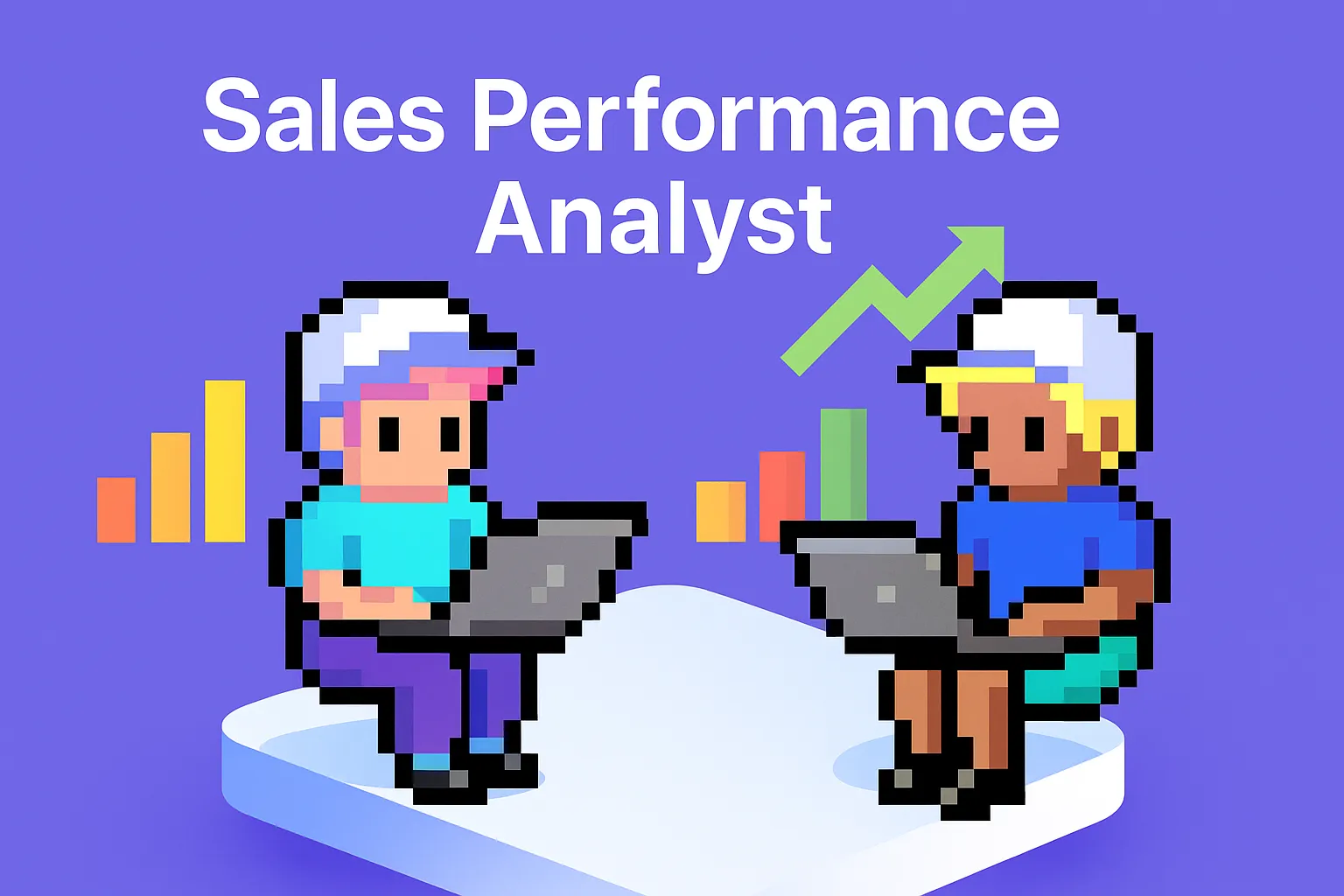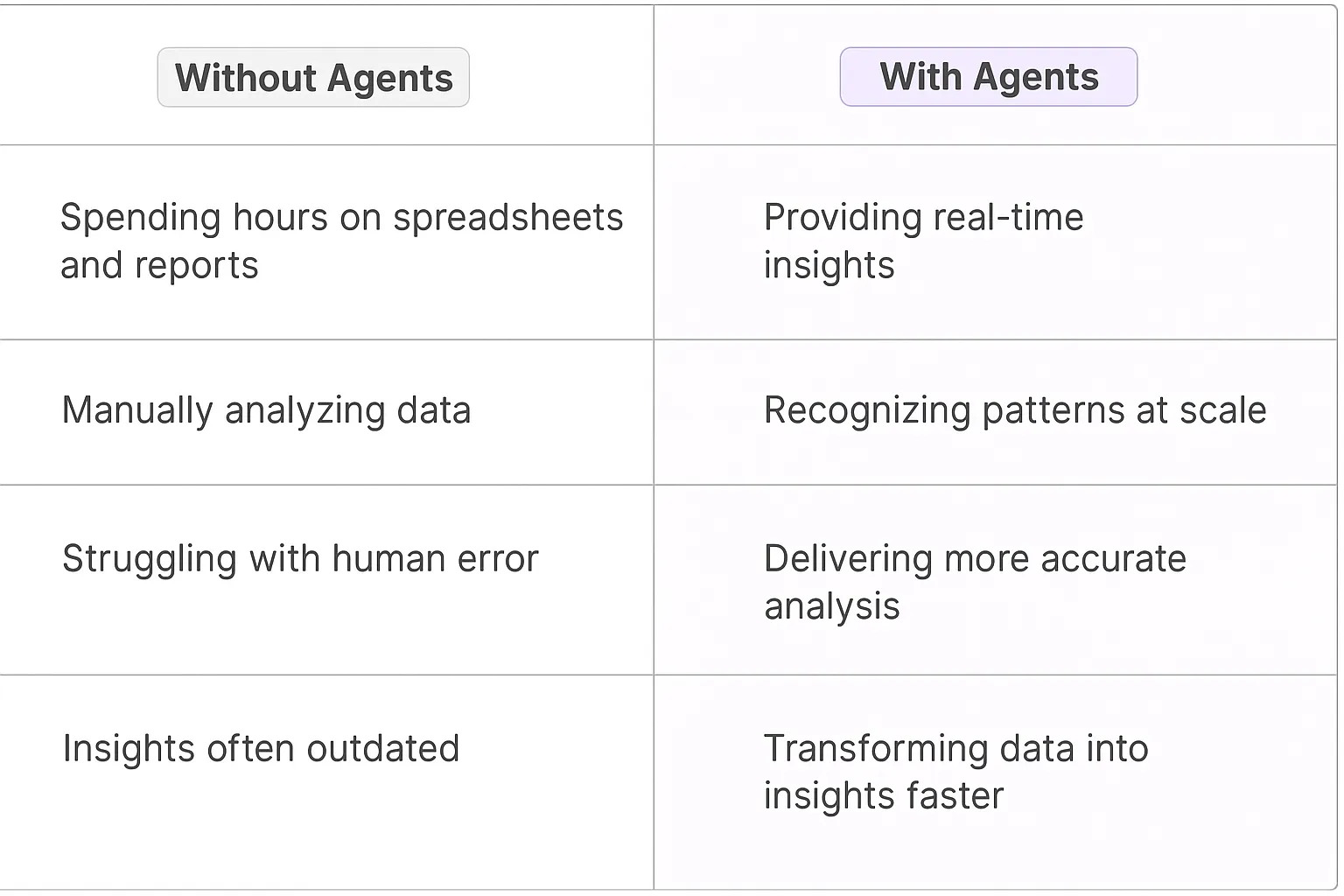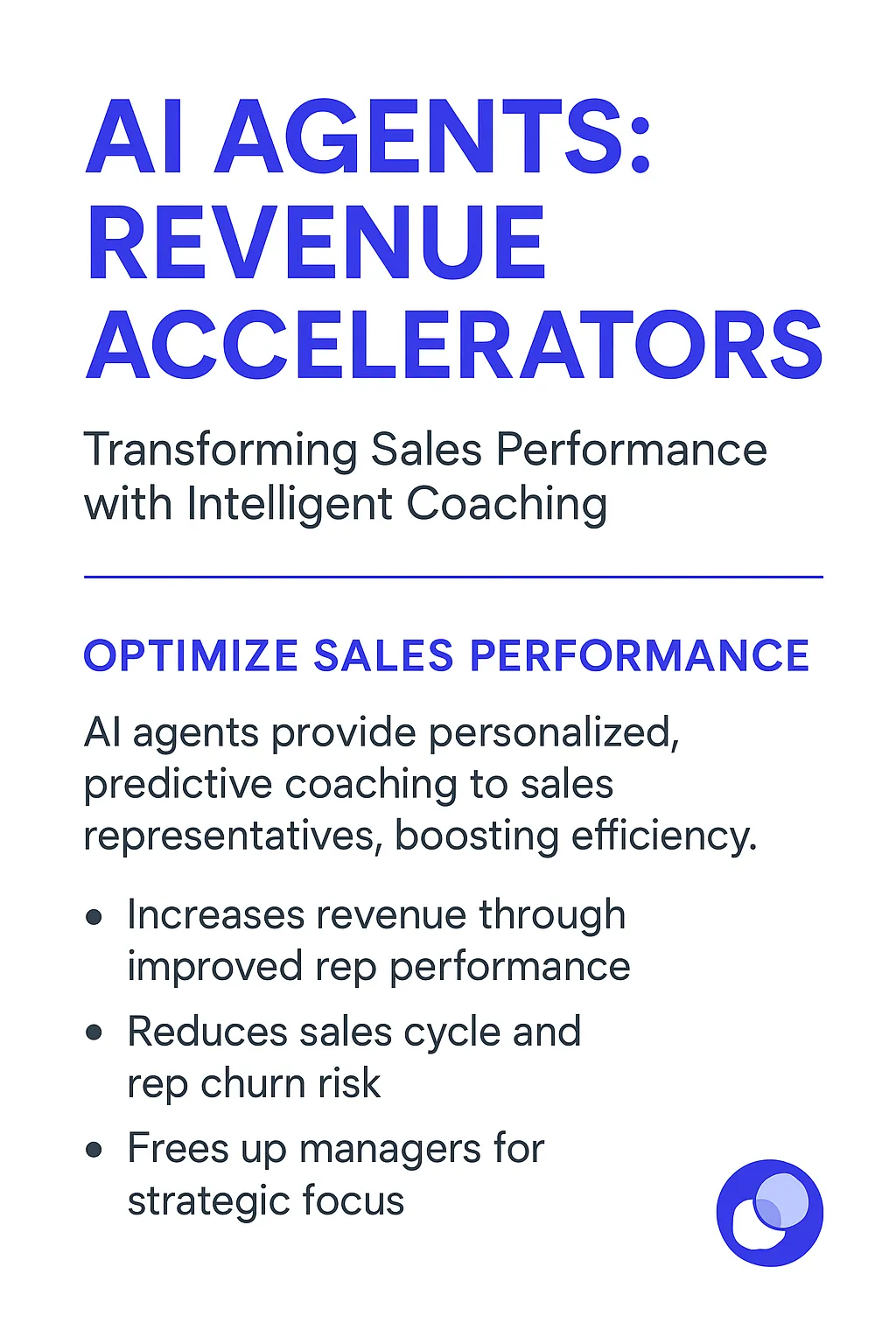Sales Performance Analyst is a cutting-edge AI-powered tool designed to transform how businesses analyze and optimize their sales processes. It's not just another analytics platform; it's a digital teammate that works tirelessly to uncover insights, predict trends, and provide actionable recommendations. By leveraging advanced machine learning algorithms, Sales Performance Analyst can process vast amounts of data from multiple sources, identifying patterns and correlations that would be impossible for human analysts to detect manually.

Let's dive into the world of sales performance analysis and how AI agents are reshaping this critical business function. As someone who's been in the trenches of tech startups and venture capital, I've seen firsthand how the right tools can make or break a sales team's success.
Traditionally, sales performance analysis was a labor-intensive process. Sales managers and analysts would spend hours poring over spreadsheets, CRM data, and various reports. They'd manually crunch numbers, create pivot tables, and struggle to piece together a coherent story from disparate data sources. It was slow, prone to human error, and often resulted in insights that were outdated by the time they reached decision-makers.
Enter AI agents for sales performance analysis. These digital teammates are game-changers, and here's why:
The bottom line? AI agents for sales performance analysis are not just incremental improvements - they're transformative tools that can give sales teams a significant competitive edge. They're turning data into actionable insights faster and more accurately than ever before, allowing sales leaders to make informed decisions that drive revenue growth.
As we move further into the AI-driven future, the companies that leverage these tools effectively will be the ones that pull ahead of the pack. It's not about replacing human intuition and experience - it's about augmenting it with powerful, data-driven insights. That's the real power of AI in sales performance analysis.

Sales performance analysis is ripe for AI-driven transformation. These digital teammates can dive deep into the sales funnel, unearthing insights that even the most seasoned analysts might miss. They're not just crunching numbers; they're decoding the DNA of successful sales strategies.
Consider the process of pipeline optimization. An AI agent can continuously monitor deal progression, identifying bottlenecks and suggesting targeted interventions. It's like having a tireless strategist who never sleeps, always fine-tuning your sales machine.
Another critical process is competitive intelligence gathering. AI agents can scrape the web, analyze social media, and synthesize market reports to give your sales team a real-time edge. This isn't just about staying informed; it's about predicting market shifts before they happen.
Let's break down some specific tasks where AI agents can be game-changers:
These AI-powered tasks aren't just incremental improvements; they're foundational shifts in how sales teams operate. They're turning gut feelings into data-driven decisions, and transforming sales from an art into a science (while still keeping that human touch that closes deals).
The real magic happens when these AI agents start working in concert. Imagine a sales ecosystem where lead scoring informs territory mapping, which feeds into pricing optimization, all while continuously learning and improving. This isn't just automation; it's amplification of human capabilities.
But here's the kicker: the companies that will win aren't just the ones with the best AI. They're the ones who can seamlessly integrate these digital teammates into their existing workflows, creating a symbiosis between human intuition and machine intelligence. That's where the real competitive advantage lies.
As we move forward, the question won't be whether to adopt AI in sales performance analysis, but how quickly and effectively you can make it an integral part of your sales DNA. The future of sales isn't human vs. machine; it's human and machine vs. the competition.

The versatility of AI agents in Sales Performance Analysis makes them valuable across various industries. Let's dive into some meaty, industry-specific use cases that showcase how AI can transform workflows and processes in ways that'll make your head spin.
These digital teammates aren't just number crunchers; they're the secret sauce that can give sales teams an edge in hyper-competitive markets. From retail to SaaS, from real estate to pharmaceuticals, AI agents are rewriting the rules of sales performance analysis.
But here's the kicker: it's not about replacing human intuition. It's about augmenting it with data-driven insights that humans simply can't process at scale. These AI agents are like having a team of MIT data scientists working 24/7, but without the astronomical salaries and egos.
So buckle up. We're about to explore how these AI agents are becoming the unsung heroes in sales departments across industries, turning data into dollars and hunches into home runs.
The retail industry is ripe for disruption, and Sales Performance Analyst AI agents are leading the charge. These digital teammates are transforming how retailers understand and optimize their sales processes, creating a new paradigm in data-driven decision making.
Take a high-end fashion retailer with multiple stores across the country. Traditionally, they'd rely on quarterly reports and gut instincts to gauge performance. Enter the Sales Performance Analyst AI. This digital powerhouse continuously crunches numbers, analyzing everything from individual store performance to specific product lines and even individual sales associate effectiveness.
The AI doesn't just regurgitate data; it uncovers hidden patterns and provides actionable insights. For instance, it might notice that a particular dress style sells exceptionally well in coastal stores during weekday evenings but underperforms in midwest locations on weekends. Armed with this knowledge, the retailer can adjust inventory distribution and marketing strategies accordingly.
But here's where it gets really interesting. The AI can correlate sales data with external factors like local events, weather patterns, and even social media trends. Suddenly, the retailer isn't just reacting to past performance; they're anticipating future demand with uncanny accuracy.
The impact on the bottom line is profound. By optimizing inventory levels, tailoring marketing efforts, and enhancing the performance of sales teams, retailers can see significant improvements in revenue and profitability. It's not just about selling more; it's about selling smarter.
This isn't some far-off future scenario. Forward-thinking retailers are already implementing these AI agents, gaining a competitive edge in an industry where margins are tight and consumer preferences shift rapidly. The question isn't whether Sales Performance Analyst AI will transform retail - it's who will be left behind when it does.
The real estate industry is notoriously resistant to change, but Sales Performance Analyst AI agents are quietly rewriting the rules of the game. These digital teammates are bringing a level of data-driven precision to an industry long dominated by "location, location, location" mantras and gut feelings.
Consider a mid-sized real estate firm operating in a competitive urban market. Traditionally, they'd rely on quarterly sales reports, market trends, and agent intuition to guide their strategy. Now, with a Sales Performance Analyst AI on board, they're operating in a different league altogether.
This AI isn't just crunching numbers; it's uncovering the DNA of successful sales. It analyzes every aspect of the sales process - from initial client contact to closing - across hundreds of transactions. The insights are game-changing. For instance, the AI might discover that properties with virtual tours get 30% more inquiries, but only if they're posted on Thursdays between 7-9 PM.
But here's where it gets really interesting. The AI correlates sales data with a vast array of external factors - local development plans, school district changes, even the opening of a new Whole Foods. Suddenly, the firm isn't just selling based on current value, but on future potential. They're not just realtors; they're becoming urban fortune tellers.
The impact on performance is profound. By optimizing everything from marketing spend to agent-property matching, firms can significantly boost their close rates and commissions. One firm I know saw a 40% increase in sales volume within six months of implementing a Sales Performance Analyst AI.
This AI is also reshaping how real estate firms build and manage their teams. By analyzing the performance patterns of top agents, firms can create more effective training programs and mentorship structures. They're not just hiring agents; they're engineering high-performance sales machines.
The real estate industry is at a tipping point. Early adopters of Sales Performance Analyst AI are already pulling ahead, leaving traditional firms in the dust. In an industry where information asymmetry has long been the norm, these AI-powered firms are bringing a new level of transparency and efficiency to the market. The question isn't whether this technology will transform real estate - it's who will be left holding the "For Sale" sign when it does.
Implementing a Sales Performance Analyst AI Agent isn't a walk in the park. It's more like trying to teach a robot to dance salsa – technically possible, but fraught with potential missteps.
First off, data integration is a beast. Sales data often lives in multiple systems – CRMs, ERPs, spreadsheets, and that one sales rep's secret notebook. Bringing all this data together in a format that's digestible for an AI is like trying to make a gourmet meal out of ingredients from five different cuisines. It's doable, but it requires serious data engineering chops.
Then there's the challenge of real-time processing. Sales environments are dynamic. A deal that was hot this morning might go cold by lunch. Your AI needs to keep up, processing and analyzing data faster than a caffeinated day trader. This requires some serious computational muscle and clever algorithm design.
Let's not forget about the AI model itself. Training a model to understand the nuances of sales performance is like teaching a computer to read between the lines. It needs to grasp context, understand human behavior, and maybe even develop a sense of intuition. We're talking about pushing the boundaries of natural language processing and predictive analytics here.
On the operational side, things get even trickier. You're essentially introducing a new team member – one that never sleeps, never takes a coffee break, and can crunch numbers faster than any human. Sounds great, right? Well, not so fast.
First, there's the human factor. Sales teams are often resistant to change, especially when that change comes in the form of an AI that might make their performance more transparent. You need to manage this transition carefully, or you risk turning your sales floor into a scene from a sci-fi rebellion movie.
Then there's the question of trust. Can your sales managers trust the AI's insights? Will they act on its recommendations? Building this trust takes time and requires the AI to consistently deliver valuable, actionable insights. It's like building a relationship, but with an entity that doesn't appreciate your jokes or your taste in music.
Data privacy and security are another can of worms. Your AI will be handling sensitive sales data – customer information, deal values, commission structures. You need to ensure this data is locked down tighter than Fort Knox, or you risk some serious legal and reputational damage.
Finally, there's the challenge of continuous improvement. The sales landscape is always evolving, and your AI needs to evolve with it. This means constant monitoring, regular retraining, and frequent updates. It's like having a high-maintenance pet that requires coding instead of kibble.
Implementing a Sales Performance Analyst AI Agent is a complex endeavor. But for those who can navigate these challenges, the potential rewards – in terms of improved sales performance and data-driven decision making – are enormous. It's not for the faint of heart, but then again, neither is sales.
Sales Performance Analyst AI agents are more than just a technological advancement; they're a paradigm shift in how businesses approach sales strategy and execution. By providing real-time, data-driven insights and predictive analytics, these digital teammates are enabling sales teams to operate with unprecedented efficiency and effectiveness. The ability to uncover hidden patterns, automate routine analysis, and provide personalized coaching at scale is transforming sales from an art into a science - without losing the human touch that closes deals.
As we've seen across various industries, from retail to real estate, the impact of these AI agents is profound. They're not just improving performance metrics; they're reshaping entire business models and competitive landscapes. However, implementing these systems comes with its own set of challenges, both technical and operational. Success lies not just in adopting the technology, but in effectively integrating it into existing workflows and cultures.
Looking ahead, the companies that will thrive are those that can strike the right balance between human intuition and AI-driven insights. The future of sales isn't about replacing humans with machines, but about creating a symbiotic relationship where each enhances the other's capabilities. As this technology continues to evolve, we can expect to see even more innovative applications and transformative impacts across industries. The sales performance analysis revolution is just beginning, and it's an exciting time to be at the forefront of this change.